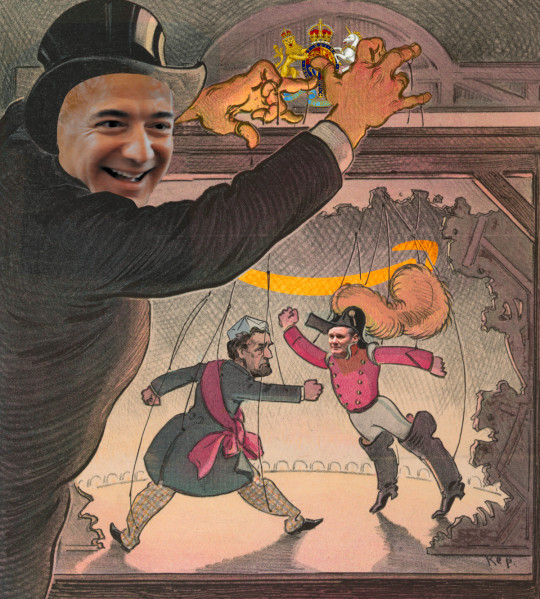#Market Competition
Explore tagged Tumblr posts
Text
#video#videos#blackrock#capitalism#market competition#market competitiveness#fascism#oppression#repression#ausgov#politas#auspol#tasgov#taspol#australia#fuck neoliberals#neoliberal capitalism#anthony albanese#albanese government
4 notes
·
View notes
Text
Capitalist Highlander — THERE CAN BE ONLY ONE
All Capitalist roads lead to Monopoly at the end, be they long or short, because Monopoly is the goal of an unfettered free market ideology.
You have many companies, all competing to offer goods and/or services in a given space, with the understanding that the "superior" company will beat out the competition and emerge victorious.
The lie we were told as children consisted of two fallacious understandings: that the struggle has no end, and that it was the superior product and/or service that would win, not the superior company. That lie disguises the fact that the superior company achieves that superiority by many, MANY means, with only a small handful having to do with shipping a product of a certain level of quality. Most of them have to do with legal abuse, creative accounting, dividing up territory, and other means of inter-corporate politics to block and/or remove competition in the first place. Most of this effort is targeted at preventing smaller competition from growing further, as not much can be done to bring down a fellow titan but wait for them to make an industry-shaking mistake and then be there to buy up the pieces off the corpse, so these titans exist in a precarious balance of power with each other.
The struggle ends, of course, with a victor who has achieved such market dominance sufficient to effectively lock out any and all competitors, aka, a monopoly. Some competition will always be permitted to deny that a monopoly has formed and lend it a degree of market legitimacy ("See! We can't be a monopoly! We have competition right over there!"), but it will only be allowed to operate within a permitted niche — it will never be allowed enough resources and breathing room to seriously challenge said monopoly's dominance. This is a big reason why a box of Honey Nut Cheerios will sell for $5-6 a box, but "Auntie Rhonny's Honeyed Nut Cereal" has to make do selling a much smaller box for $8-10 even if their product were objectively better in every way; the dominant power sets the terms of the market such that their competition stays small and token.
Even "better" is when the monopoly can turn their small competitors into customers. For instance, Samsung sells their smartphone screens at an affordable price both to major competitors like Apple, and also to smaller, more niche brands like Unihertz. This makes those smaller companies dependent on the titan they are in direct competition with, ensuring they cannot grow above a certain level. After all, if Unihertz started approaching getting big enough to think about maybe making their OWN displays, Samsung could simply prematurely cut off Unihertz's supply and prevent further growth in that direction, forcing them to either fold or find a new source of displays that may not be of the same quality that their customers have come to expect, which might do further damage. This dependency on Unihertz's part assures that Samsung wins and maintains their dominance over one market or another, no matter what happens.
Capitalist thought is much like The Highlander: "there can be only one". The process will continue until each market segment is dominated by a superior company, and then that King can behave largely how they want, because a lack of meaningful competition means people have no alternative.
It goes without saying that this is ultimately bad for consumers AND workers. Only the "competition" phase is any good for us, and even then, it has to be competition predicated on the ideal of selling a superior product or service. For that, in the current status quo, you need a strong government with powerful anti-trust laws and pro-worker and pro-consumer regulations and a vested interest and willingness to enforce them.
There are potential socioeconomic overhauls (of which Marxism and its various descendants are overwhelmingly the most well known) that could flip this script completely by investing power elsewhere and even redefine what a corporation even IS, but those are simply potential overhauls that will require a revolution (of one sort or another) to accomplish, so for the purposes of this post, they aren't very practical to discuss.
In the system we have, right here, right now, the only way to prevent monopoly is by using government regulations and anti-trust to physically intervene and prevent them, and break them up where they HAVE formed. Which is to say, the United States is probably already fucked. But the rest of you guys might manage something with enough action.
4 notes
·
View notes
Link
The article "Springfield Hellcat Pro BB Gun Review — Red Dot Ready Air Pistol" by Clayton Walker on The Armory Life provides a detailed review of the Hellcat Pro BB gun, manufactured by Air Venturi in collaboration with Springfield Armory. Walker examines the air gun replica, highlighting its striking resemblance and functionality compared to its actual firearm counterpart, the 9mm Hellcat Pro. Emphasizing its utility as a training tool, Walker notes that the CO2-powered .177 caliber air pistol features a polymer frame, a steel barrel and slide, and red dot sight capability. The gun's weight is almost identical to the actual firearm, enhancing its realism as a training aid. Walker appreciates the BB gun's precision, stating that it is ideal for beginners to learn shooting basics owing to its accuracy and noise simulation, as well as for experienced shooters looking to practice sophisticated skills safely. The review acknowledges the BB gun as an excellent option for honing shooting skills in a controlled setting while stressing the importance of following local ordinances and continuing practice with live firearms.
#Springfield Armory#Hellcat Pro BB gun#review#air gun#CO2 cartridges#performance#accuracy#magazine capacity#trigger pull#ergonomics#sights#safety features#recoil management#shooting experience#target practice#firearm enthusiasts#training tool#price point#accessories#market competition#user feedback#product specifications.
0 notes
Text
A 21st Century Business Strategy for Posts in Developing Regions.

Commoditization of postal products has made the courier and express parcel (CEP) market competition time-sensitive. In this kind of market, a longer lead-time period – the time between ordering/booking and delivery - is fatal for any postal or courier organization, while speed and service excellence are now even more paramount than the product itself or its price. For many Posts in developing countries, these rapid changes call for a profound adaptation of their strategies, operations and business models.
Learn more about A 21st Century Business Strategy for Posts in Developing Regions
#courier and express parcel#postal products#Commoditization#market competition#rapid changes#postal organizations#postal administrations#strategy adaptation#business models#universal postal union#postal sectors#speed and service excellence#developing countries#postal matters
0 notes
Text
Case Study: Reviving BSNL through Strategic Initiatives and Stock Exchange Listing 📈📞
Introduction Bharat Sanchar Nigam Limited (BSNL) has been grappling with market competition, especially against private giants like Jio, Airtel, and Vodafone Idea (VI). This case study explores BSNL’s revival strategies, particularly through infrastructure upgrades, competitive pricing, and the potential benefits of listing on the stock exchange. 💡 Current Market Landscape Competitive…
#BSNL#Customer Experinece#Digital India#Financial Restructuring#Innovation In Telecom#IPO#Market Competition#Rural Connectivity#Telecom Infrastructure#Telecom Revival
0 notes
Text
Customer Relationship Management
The key to success lies not only in acquiring customers but also in nurturing relationships that last. This is where Customer Relationship Management, or CRM, emerges as a powerful ally for businesses seeking to thrive in the digital age. More than just a software solution, CRM represents a philosophy—a commitment to understanding, engaging, and delighting customers at every touchpoint.
In this article, we embark on a journey to uncover the essence of CRM, exploring its transformative potential, practical applications, and the profound impact it has on shaping modern business strategies. Join us as we delve into the world of CRM and unlock the secrets to building enduring customer connections that drive sustainable growth and prosperity.
What is CRM?
Customer Relationship Management (CRM) is like a superhero for businesses, helping them build strong and lasting connections with customers. It's a special tool that keeps track of all the important information about customers – like what they like, what they buy, and how they interact with the company. This way, businesses can understand their customers better, offer personalized experiences, and make sure everyone in the company is on the same page when it comes to customer relationships. It's not just about selling stuff; it's about creating happy customers and making the business thrive.
Advantages of CRM
CRM (Customer Relationship Management) offers numerous advantages for businesses. The following points explain how it helps companies better understand their customers, improve customer satisfaction, and streamline sales processes.
1) Customer Insight:
It collects and organizes valuable customer data, offering businesses a comprehensive view of their preferences, purchase history, and interactions. This insight allows companies to anticipate customer needs and deliver personalized experiences.
2) Efficient Communication:
With CRM, communication becomes streamlined. Teams across sales, marketing, and customer service can access the same up-to-date customer information, ensuring consistency and coherence in interactions. This not only saves time but also prevents misunderstandings.
3) Customer Retention:
By identifying and addressing customer needs, CRM helps build loyalty. Proactive customer service, personalized offers, and timely follow-ups contribute to a positive customer experience, reducing the likelihood of customers seeking alternatives.
4) Market Adaptability:
In a constantly evolving market, businesses need to adapt quickly. It aids in tracking market trends and customer feedback, enabling companies to adjust their strategies and offerings to stay relevant.
5) Sales Growth:
CRM systems empower sales teams by providing them with tools to manage leads, track opportunities, and forecast sales. The result? Increased efficiency, improved conversion rates, and a better understanding of the sales pipeline.
“Explore deeper insights and practical strategies to elevate your CRM game on platforms like Study24hr.com, where a plethora of courses offer invaluable knowledge tailored to your needs. The platform empowers you to unlock your full potential in nurturing lasting customer relationships. Embark on your journey to CRM excellence today and redefine the way you connect with your customers on Study24hr.com's dynamic learning platform.”
How CRM Helps Businesses Remain Competitive
With CRM, businesses can better understand customer needs, improve customer satisfaction, and ultimately, enhance their market position in a rapidly evolving business landscape. The subsequent details elaborate on how it contributes to these aspects.
1) Tailored Customer Experiences:
CRM allows businesses to craft personalized experiences for customers, from targeted marketing campaigns to customized products or services. This personal touch sets companies apart in a market where individuality matters.
2) Agile Decision-Making:
Informed decision-making is a competitive advantage. It provides real-time insights, enabling businesses to make agile decisions based on current market trends and customer feedback, rather than relying on historical data alone.
3) Enhanced Collaboration:
Collaboration among teams is key to success. Customer Relation Management fosters seamless communication and collaboration between departments, breaking down silos and ensuring that everyone is on the same page when it comes to customer interactions.
4) Efficiency and Cost Savings:
Streamlining processes through CRM not only enhances efficiency but also reduces operational costs. Automation of routine tasks frees up valuable time for employees to focus on high-impact activities, ultimately contributing to the bottom line.
The Conclusion
In summary, CRM is not just a tool; it's a strategic approach that places customers at the heart of business operations. By leveraging the insights and efficiencies offered by CRM, businesses can create meaningful connections, drive growth, and, most importantly, remain competitive in a market where customer relationships are the currency of success.
#crm#customers#business#trust#customer satisfaction#customer engagement#growth#market competition#user experience
0 notes
Text
Spotify's CEO, Daniel Ek says Apple's EU DMA announcement is "at best vague and misleading"
Today, Spotify’s CEO, Daniel Ek, penned a blog post expressing his criticism of the alterations Apple has made to its app ecosystem in the European Union under the Digital Markets Act. He accused Apple of presenting “a new plan that is a complete and total farce” under the guise of “compliance and concessions.” Ek asserts that Apple doesn’t believe “the rules apply to them,” and he anticipates…

View On WordPress
#Anti-Competitive#Antitrust#App Store#Apple#Apple App Store#iOS#iOS App Store#Market Choice#Market Competition#Spotify
0 notes
Text
Considering the Drivers of Change in the Legal Industry
Considering the Drivers of Change in the Legal Industry
The legal industry is undergoing significant changes driven by various factors, such as technology developments, evolving client demands, market competition, and regulatory shifts. In this blog post, we will explore some of the major trends and challenges that are shaping the future of legaltech, and how they impact both law firms and legal service providers. Technology developments One of…

View On WordPress
#drivers of change#evolving client demands#legal industry#market competition#technology developments
0 notes
Text
Keir Starmer appoints Jeff Bezos as his “first buddy”

Picks and Shovels is a new, standalone technothriller starring Marty Hench, my two-fisted, hard-fighting, tech-scam-busting forensic accountant. You can pre-order it on my latest Kickstarter, which features a brilliant audiobook read by Wil Wheaton.

Turns out Donald Trump isn't the only world leader with a tech billionaire "first buddy" who gets to serve as an unaccountable, self-interested de facto business regulator. UK PM Keir Starmer has just handed the keys to the British economy over to Jeff Bezos.
Oh, not literally. But here's what's happened: the UK's Competitions and Markets Authority, an organisation charged with investigating and punishing tech monopolists (like Amazon) has just been turned over to Doug Gurr, the guy who used to run Amazon UK.
This is – incredibly – even worse than it sounds. Marcus Bokkerink, the outgoing head of the CMA, was amazing, and he had charge over the CMA's Digital Markets Unit, the largest, best-staffed technical body of any competition regulator, anywhere in the world. The DMU uses its investigatory powers to dig deep into complex monopolistic businesses like Amazon, and just last year, the DMU was given new enforcement powers that would let it custom-craft regulations to address tech monopolization (again, like Amazon's).
But it's even worse. The CMA and DMU are the headwaters of a global system of super-effective Big Tech regulation. The CMA's deeply investigated reports on tech monopolists are used as the basis for EU regulations and enforcement actions, and these actions are then re-run by other world governments, like South Korea and Japan:
https://pluralistic.net/2024/04/10/an-injury-to-one/#is-an-injury-to-all
The CMA is the global convener and ringleader in tech antitrust, in other words. Smaller and/or poorer countries that lack the resources to investigate and build a case against US Big Tech companies have been able to copy-paste the work of the CMA and hold these companies to account. The CMA invites (or used to invite) all of these competition regulators to its HQ in Canary Wharf for conferences where they plan global strategy against these monopolists:
https://www.eventbrite.co.uk/e/cma-data-technology-and-analytics-conference-2022-registration-308678625077
Firing the guy who is making all this happening and replacing him with Amazon's UK boss is a breathtaking display of regulatory capture by Starmer, his business secretary Jonathan Reynolds, and his exchequer, Rachel Reeves.
But it gets even worse, because Amazon isn't just any tech monopolist. Amazon is a many-tentacled kraken built around an e-commerce empire. Antitrust regulators elsewhere have laid bare how Amazon uses that retail monopoly to take control over whole economies, while raising prices and crushing small businesses.
To understand Amazon's market power, first you have to understand "monopsonies" – markets dominated by buyers (monopolies are markets dominated by sellers – Amazon is both a monopolist and a monopsonist). Monopsonies are far more dangerous than monopolies, because they are easier to establish and easier to defend against competitors. Say a single retailer accounts for 30% of your sales: there isn't a business in the world that can survive an overnight 30% drop in sales, so that 30% market share might as well be 100%. Once your order is big enough that canceling it would bankrupt your supplier, you have near-total control over that supplier.
Amazon boasts about this. They call it "the flywheel": Amazon locks in shoppers (by getting them to prepay for a year's worth of shipping in advance, via Prime). The fact that a business can't sell to a large proportion of households if it's not on Amazon gives Amazon near-total power over that business. Amazon uses that power to demand discounts and charge junk fees to the businesses that rely on it. This allows it to lower prices, which brings in more customers, which means that even more businesses have to do business with Amazon to stay afloat:
https://vimeo.com/739486256/00a0a7379a
That's Amazon's version, anyway. In reality, it's a lot scuzzier. Amazon doesn't just demand deep discounts from its suppliers – it demand unsustainable discounts from them. For example, Amazon targeted small publishers with a program called the "Gazelle Project." Jeff Bezos told his negotiators to bring down these publishers "the way a cheetah would pursue a sickly gazelle":
https://archive.nytimes.com/bits.blogs.nytimes.com/2013/10/22/a-new-book-portrays-amazon-as-bully/
The idea was to get a bunch of cheap books for the Kindle to help it achieve critical mass, at the expense of driving these publishers out of business. They were a kind of disposable rocket stage for Amazon.
Deep discounts aren't the only way that Amazon feeds off its suppliers: it also lards junk-fee atop junk-fee. For every pound Amazon makes from its customers, it rakes in 45-51p in fees:
https://pluralistic.net/2023/11/29/aethelred-the-unready/#not-one-penny-for-tribute
Now, just like there's no business that can survive losing 30% of its sales overnight, there's also no business that can afford to hand 45-51% of its gross margin to a retailer. For businesses to survive at all on Amazon, they have to jack their prices up – way up. However, Amazon has an anticompetitive deal called "most favoured nation status" that forces suppliers to sell their goods on Amazon at the same price as they sell them elsewhere (even from their own stores). So when companies raise their prices in order to pay ransom to Amazon, they have to raise their prices everywhere. Far from being a force for low prices, Amazon makes prices go up everywhere, from the big Tesco's to the corner shop:
https://pluralistic.net/2023/04/25/greedflation/#commissar-bezos
Amazon makes so much money off of this scam that it doesn't have to pay anything to ship its own goods – the profits from overcharging merchants for "fulfillment by Amazon" pay for all the shipping, on everything Amazon sells:
https://cdn.ilsr.org/wp-content/uploads/2023/03/AmazonMonopolyTollbooth-2023.pdf
Amazon competes with its own sellers, but unlike those sellers, it doesn't have to pay a 45-51% rake – and it can make its competitor-customers cover the full cost of its own shipping! On top of that, Amazon maintains the pretense that its headquarters are in Luxembourg, the tax- and crime-haven, and pays a fraction of the taxes that British businesses pay to HMRC (and that's not counting the 45-51% tax they pay to Jeff Bezos's monoposony).
That's not the only way that Amazon unfairly competes with British businesses, though: Amazon uses its position as a middleman between buyers and sellers to identify the most successful products sold by its own customers. Then it copies those products and sells them below the original inventor's costs (because it gets free shipping, pays no tax, and doesn't have to pay its own junk fees), and drives those businesses into the ground. Even Jeff "Project Gazelle" Bezos seems to understand that this is a bad look, which is why he perjured himself to the American Congress when he was questioned under oath about it:
https://www.bbc.com/news/business-58961836
Amazon then places its knockoff products above the original goods on its search results page. Amazon makes $38b selling off placement on these search pages, and the top results for an Amazon search aren't the best matches for your query – they're the ones that pay the most. On average, Amazon's top result for a search is 29% more expensive than the best match on the site. On average, the top row of results is 25% more expensive than the best match on the site. On average, Amazon buries the best result for your search 17 places down the results page:
https://pluralistic.net/2023/11/03/subprime-attention-rent-crisis/#euthanize-rentiers
Amazon, in other words, acts like the business regulator for the economies it dominates. It decides what can be sold, and at what prices. It decides whose products come up when you search, and thus which businesses deserve to live and which ones deserve to die. An economy dominated by Amazon isn't a market economy – it's a planned economy, run by Party Secretary Bezos for the benefit of Amazon's shareholders.
Now, there is a role for a business regulator, because some businesses really don't deserve to live (because they sell harmful products, engage in deceptive practices, etc). The UK has a regulator that's in charge of this stuff: the Competition and Markets Authority, which is now going to be run by Jeff Bezos's hand-picked UK Amazon boss. That means that Amazon is now both the official and the unofficial central planner of the UK economy, with a free hand to raise prices, lower quality, and destroy British businesses, while hiding its profits in Luxemourg and starving the exchequer of taxes.
The "first buddy" role that Keir Starmer just handed over to Jeff Bezos is, in every way, more generous than the first buddy deal Trump gave Elon Musk.
Starmer's government claims they're doing this for "growth" but Amazon isn't a force for growth, it's force for extraction. It is a notorious underpayer of its labour force, a notorious tax-cheat, and a world-beating destroyer of local economies, local jobs, and local tax bases. Contrary to Amazon's own self-mythologizing, it doesn't deliver lower prices – it raises prices throughout the economy. It doesn't improve quality – this is a company whose algorithmic recommendation system failed to recognize that an "energy drink" was actually its own drivers' bottled piss, which it then promoted until it was the best-selling energy drink on the platform:
https://pluralistic.net/2023/10/20/release-energy/#the-bitterest-lemon
There's a reason that the UK, the EU, Japan and South Korea found it so easy to collaborate on antitrust cases against American companies: these are all countries whose competition law was rewritten by American technocrats during the Marshall Plan, modeled on the US's own laws. The bedrock of US competition law is 1890's Sherman Act, whose author, Senator John Sherman, declared that:
If we will not endure a King as a political power we should not endure a King over the production, transportation, and sale of the necessaries of life. If we would not submit to an emperor we should not submit to an autocrat of trade with power to prevent competition and to fix the price of any commodity.
https://pluralistic.net/2022/02/20/we-should-not-endure-a-king/
Jeff Bezos is the autocrat of trade that John Sherman warned us about, 135 years ago. And Keir Starmer just abdicated in his favour.

Check out my Kickstarter to pre-order copies of my next novel, Picks and Shovels!

If you'd like an essay-formatted version of this post to read or share, here's a link to it on pluralistic.net, my surveillance-free, ad-free, tracker-free blog:
https://pluralistic.net/2025/01/22/autocrats-of-trade/#dingo-babysitter

Image: UK Parliament/Maria Unger (modified) https://commons.wikimedia.org/wiki/File:Keir_Starmer_2024.jpg
CC BY 3.0 https://creativecommons.org/licenses/by/3.0/deed.en
--
Steve Jurvetson (modified) https://commons.wikimedia.org/wiki/File:Jeff_Bezos%27_iconic_laugh.jpg
CC BY 2.0 https://creativecommons.org/licenses/by/2.0/deed.en
#pluralistic#cma#competition and markets authority#dmu#digital markets unit#guillotine watch#silicon roundabout#Marcus Bokkerink#doug gurr#industrial policy henhouse foxes#dingo babysitters#ukpoli#labour#competition#antitrust#trustbusting#marshall plan#Jonathan Reynolds#regulatory capture#keir starmer
315 notes
·
View notes
Text
Allegations of price collusions among the potato cartel reveal the new, sophisticated methods food corporations are using to keep prices high.
126 notes
·
View notes
Text

#salamence#THIS one is a good one. someone else mentioned the chin and claimed they look like lord farquaad. and would say “why YES this is Divine” and#i didn't like how accurate that was. anyway dragon/flying 4x weakness to ice my belovèd. if anyone says ice is bad#keep in mind how much of the competitive landscape it totally nullifies. ice is like. probably my second favorite type. behind electric#even though none of this is about salamence. they've got the whole primary colors thing going on but minus yellow#red and blue. red white and blue. american pokémon? big red wings that're just Flat. i really dunno what's happening here i just know it's#supposed to be really good in competitive. and also they got a paradox form which i Guess TPC is trying to market as totally new unrelated#pokémon but i'm always going to call them “paradox hariyama” and such instead of ~iron hands~ or whatever they're supposed to be called#don't want my pokémon names to have two words in them……
692 notes
·
View notes
Text
"Thereafter escaping from the Orcs Beren dwelt still in those lands as a solitary outlaw for four years, and did such deeds of single-handed daring that Morgoth put a price on his head no less than upon the head of Fingon King of the Noldor."
There is a lot going on here but I frankly cannot stop thinking about Morgoth putting prices on people's heads. Like, what is the price? Money?? Is Sauron printing coins in Angband as a side hussle? Does anybody at this point trust Morgoth to keep a promise like money/lands/whatever the fuck that price is, considering the countless infamous stories of Morgoth Not Keeping His Word EverTM? Do people who are desperate bring by heads of people who they think look similar??? Like I have QuestionsTM! how does Mafia Boss Morgoth work what's the details are there wanted posters? Do people collect wanted posters?? Hell I want a wanted poster. damn it
#*mine#mona rambles#tolkien#morgoth#beren#fingon#silm#is there a black market of people trading wanted posters. what's angband's communication strategy here#are there light- to not-so-light-hearted bragging competitions on who has the highest price on their head#who is the most insufferable and why is it fingon <3
51 notes
·
View notes
Text



Some sketches inspired by @theunqualified1's fic Chalk It Up To Luck You can find some more drawings for this AU here
also little bonus bc i had to figure out their uniforms:

#critical role#critical role c3#imogen temult#laudna cr#imodna#my art#my stuff#Chalk It Up To Luck fic#drawing things for this au was so much fun#and figuring out the uniforms was also nice#don't know shit about bouldering tho so don't come for me pls#anyway some little details about this#the symbol on the chest of their uniform is the republic of tal'dorei's symbol#and i think you guys can recognize most of the things on the backdrop of the interview but#it's the m9 logo the ashari symbol the moons ofc#and that big A is a market thing#since that competition takes place in market#i found this handy little chart on the wiki with a bunch of exandria's symbols in it and that was very helpful
87 notes
·
View notes
Text











chinese guzhuang fashion
#young actress and actors are cornering the guzhuang market#that's why the industry is becoming more and more competitive#when it comes to guzhuang idol dramas/guouju古偶剧 with fantasy elements(like xianxia dramas)#cnetizens are bored with the same old faces#media has found that young actress and actors (20-27 years old) especially new pretty faces are more appealing to viewers#cnetizens can actually be mean to actress and actors (over 33 years old) cast as lead characters in guzhuang idol dramas#reasons is that lead characters are usually portrayed as teenagers or really young people#and the audience find it very weird to have middle-aged people cast such characters#especially scripts are usually adapted based on fictions#so fans of the novels would be furious about such casting#besides cnetizens want to see normal aging faces#but these shows always use excessive filters and PS#causing the midle-aged faces to be fake and weird#i once saw really mean comments on douyin for xianxia dramas casting middle-aged actress getting over one hundred thousand likes#actress and actors in zhengju正剧 guzhuang dramas or luodi落地 guzhuang dramas are not affected by this#like telling a realistic down-to-earth story or story inspired by real history or related to folks#and there is no fantasy or xianxia elements#china#fashion#chinese fashion#guzhuang#cdramas
315 notes
·
View notes
Text






It's just, I only just got here again, and I'm--
I'm starving, too, like...
#greg hirsch#i went to market#all the bells say#tomgreg#this is clearly something greg says bc he's actively trying to show more self worth - but also as a beg for love#like 'give me a REASON'#tell me you don't just need me but WANT me#and what's interesting is that while these scenes basically yell to the audience Greg Is Important To The Plot#both scenes also make it clear that greg is not in fact important in the way he's claiming to be#kendall makes a point of getting ewan a ride but NOT for greg's sake - it's entirely for his own benefit#bc of a larger plan that greg has nothing to do with#and in all the bells say greg wants to assert that tom has competition wrt keeping him#and tom shoots down that competition#but the truth is there really wasn't any. greg is important - a big deal - ONLY to tom#tom's the one who will choose him and keep him fed and treat him as someone important#mine
37 notes
·
View notes
Note
Good luck with exams!
Waaah anon!
I graduated college a while ago, so I'm finals/exams free lol the one paper I was agonizing over was for a 6 month course I was forced to take by my current employer lol but like, it was that one final assignment so I can get a certificate that I did + passed the course so my employer can be happy about it
The place where I work at likes having it's team "up to date" with the new design and marketing stuff, so courses like this are pretty common, at least that's what my coworkers say lol
Anyway I WILL however pass on your lovely wishes to whoever is reading this who has finals/exams this week! Anon and I wish u best of luck, guys!
#I'm a graphic designer with a minor in marketing#and i work in the marketing team of a brand rn#i also have a master's in publishing but like I'm not working in publishinf rn (SAD)#i really wanna work in publishing but it's so competitive where i live oooough#one day i will put that master's to use lmao#miry's ask box
26 notes
·
View notes